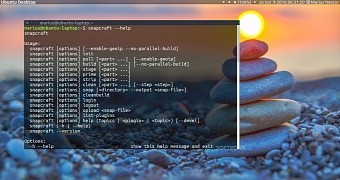Canonical's Sergio Schvezov published today, February 1, 2017, a new stable update of the Snapcraft utility that Open Source application developers can use to package their apps as Snaps.
Snappy is Canonical's application sandboxing and distribution framework and Snap is a universal binary format designed to allow devs to distribute their apps across multiple Linux-based operating systems without having to create a special package for each distro. Snapcraft is the tool to build the Snap packages.
The latest version, Snapcraft 2.26, comes approximately two weeks after the release of version 2.25 and promises to introduce a bunch of new features, such as support for GUI (Graphical User Interface) in Snaps, a new plugin directory location, support for snapcraft.yaml in a Snap directory, as well as support for go-packages.
Snapcraft 2.26 also removes the snapd "submodule," makes sure snap.yaml is desktop free, implements proper error colors for login failures to the Snappy Store, fixes sso_host for developer single sign-on (SSO), adds support for gradle and gradlew to the Gradle plugin, and introduces the use of an XDG directory for sources.
Ubuntu users are now added to sudoers on every ADT platform
Among other noteworthy features implemented in the Snapcraft 2.26 release, we can mention support for adding Ubuntu users to sudoers on every ADT platform for tests, multi-arch support for stage packages, the ability to preserve symlinks to directories for sources, and support for the Python plugin to download all required packages with a single command.
It also looks like Snapcraft now allows for the use of a temporary directory for Snaps tests, increases the timeout for the ROS (Robot Operating System) Snap test, adds g++ as a dependency to 01-reusable-part, updates the Catkin plugin to no longer stage compilers, and ensures desktop files are renamed to match the application names.
The autotools plugin has been updated as well to extend the Make plugin, and the parser is now capable of handling both parser and network errors. Snapcraft will now use the actual userspace architecture when building Snap packages in 32-bit environments. You can see the entire list of changes attached below.
Snapcraft 2.26 has been tagged on GitHub as released for Ubuntu 16.04 LTS (Xenial Xerus) operating systems, but it should also be installable on Ubuntu 16.10 (Yakkety Yak) machines. Make sure that you update Snapcraft to version 2.26 as soon as the new packages land in the stable repositories.

 14 DAY TRIAL //
14 DAY TRIAL //